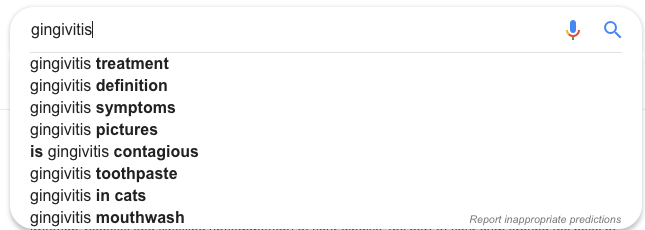Keywords are the words and phrases that users type into search engines when they are searching the internet. Keywords provide clues that search engines, like Google or Bing, use to establish what your website pages are all about. Keywords can be as short as a single word, a 3-7 word phrase, or much longer. These longer keywords are known as "long-tail keywords." Long tail keywords have lower search volume, but are highly focused, meaning they typically convert well.
Once you search for a keyword or phrase in a search engine, it will try and deliver the most useful and relevant content in relation to your search phrase. The most relevant results will appear on page one, which is where you want your content to live.
Keywords + Blogging = SEO
Blogging is the ultimate SEO tool because it allows you to rank for a variety of keywords using one piece of content.
When you strategically use multiple keywords in a blog post it increases your likelihood of being found at the top of the organic search results page for the keywords and phrases that are most relevant to your business.
To get the most out of your blog investment, you need to write your blogs for your target audience and optimize the blog content for search engines.
Keyword Research
Keyword research is an important step in creating and optimizing your content. It is used to identify popular words and phrases people enter into search engines.
Keyword research will help you figure out what keywords you should try to rank for with your content. Some terms to understand in relation to keywords research are:
- Search Volume - The amount of searches that a keyword or term receive per month.
- Search Competition - This can refer to how many pages on the internet include that term, thus, the number of pages you will be competing against. If you are using Google Adwords, search competition can also refer to the number of advertisers that are running ads on Google Adwords for this specific keyword.
Strategic blogging means having an understanding of how high the demand is for certain keywords, and how hard it would be to compete for those terms. By researching the words and phrases your potential customers search, and using this research to create content that is targeted to their specific questions, you can drive high-converting traffic to your website.
Just remember to go for keywords that are:
- Valuable to your website and content
- Have high search volume
- Have low search competition
Follow these three steps and you will get the most SEO success from your blogs.
Placing Keywords in Your Blogs
Keywords are the bread and butter of SEO, and can make or break your content marketing efforts.
Once you establish your content topic, you should identify the keywords that relate to your content using keyword research. An example could be that you are a dental practice writing a blog centered around "gingivitis".
Gingivitis has a search volume of 130,000 per month and has a low competition score: 18 out of 100. This is a good sign!
Google suggestions tells us there are other relevant long-tail keywords for gingivitis.

Do any of these long-tail keywords align with your content? If so, great, use them!
Mindfully writing your content while building in long-tail keywords will help your content rank for more terms and searches about your core topic.
Don't forget to include local keywords in your SEO strategy. Local keywords will help you outrank your competitors in local search results.
Leave the Keyword Stuffing in 2008
It is important not to 'stuff' keywords in your blogs for the sake of trying to get a higher rank. Keyword stuffing is now penalized by search engines, and does more harm to your website's SEO than good.
A great way to avoid keyword stuffing is to keep your writing style conversational and natural. Read your content back to yourself. Does it sound like you? Or does it sound like someone trying to cram in extra words?
Pay attention to your keyword density, or percentage of a particular keyword used throughout your content, and keep it at a reasonable percentage. What's considered reasonable? It depends on the keyword, but three to five times is typically considered safe and effective. Keeping your keyword density in check ensures that you rank for terms, but don't hurt your keyword efforts.
Here are a few tips you can follow when blogging for SEO:
- To get the most out of your keywords research, keywords should be used not only in your content's body, but also in the title and headings. Just like a good book, your blog's title will give readers, and search engines, an idea of what your content is all about.
- Try to keep your content and keywords focused. A blog about too many different subjects isn't as strong as a topic-concise blog with 10-20 focused keywords.
- Put yourself in your customer's shoes when it comes to keyword research, and ask yourself what customers generally want or need from you and your business. For example, if you are an esthetician, customers may frequently ask you and search for chemical peel recommendations. This can help the keyword process of blogging flow naturally.
- Trust the professionals. Hiring an inbound marketing agency skilled at blogging ensures that the right keyword research will go into your content. This eliminates stress on your end, and frees up your time to work your business and leave the marketing to a professional.




